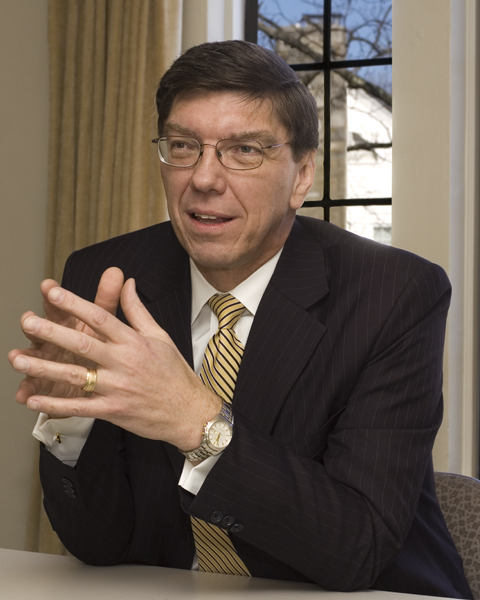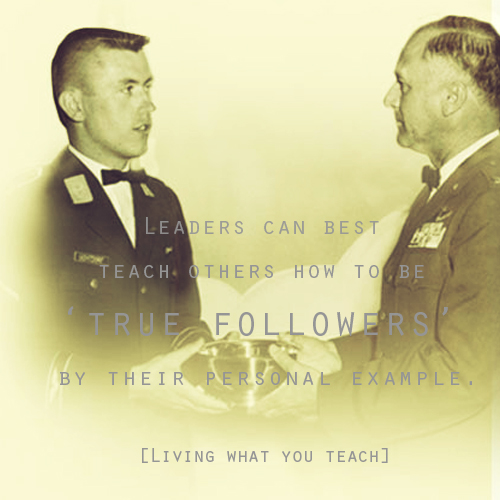 Five Brigham Young University (BYU) graduates were among those named on the prestigious Thinkers50 list of the best business management thought-leaders of 2015. In fact, this year, for the first time, BYU graduates made up 10 percent of those listed. The graduates that were listed include Clayton Christensen, the Harvard business professor who introduced the concept of “disruptive innovation, at No. 2, Dave Ulrich (27), Liz Wiseman (43), Hal Gregersen (46) and Whitney Johnson (49). As a note of interest, Christensen finished first in the biennial rankings in 2011 and 2013.
Five Brigham Young University (BYU) graduates were among those named on the prestigious Thinkers50 list of the best business management thought-leaders of 2015. In fact, this year, for the first time, BYU graduates made up 10 percent of those listed. The graduates that were listed include Clayton Christensen, the Harvard business professor who introduced the concept of “disruptive innovation, at No. 2, Dave Ulrich (27), Liz Wiseman (43), Hal Gregersen (46) and Whitney Johnson (49). As a note of interest, Christensen finished first in the biennial rankings in 2011 and 2013.
Dave Ulrich commented, “Like a smaller boxer who succeeds against bigger fighters, “BYU outpunches its weight.” But a person might ask, “How does this happen? Why does BYU make up a substantial portion of the Thinkers50?”
A Sunday, 3 January 2016 Deseret News article suggests:
The answers range from the mundane — how lists are compiled — to the intriguing — what the dean of BYU’s business school calls the Clayton Christensen Effect. Christensen earned an economics degree at BYU and went on to write “The Innovator’s Dilemma,” which “deeply influenced” Apple’s Steve Jobs. His ideas on innovative disruption have had such a broad impact that “disruption” is becoming a household term describing, for example, what is happening right now with cable TV cord-cutting. Gregersen and Johnson have worked directly with Christensen.
Influence of The Church of Jesus Christ of Latter-day Saints
 Dave Ulrich suggests that perhaps a more viable answer to the questions can be found in the influence that The Church of Jesus Christ of Latter-day Saints has had on the lives of the 5 BYU alumni that are listed. He further commented, “Five LDS people on the list is amazing. I credit the LDS learning system. BYU, I think, through the missions served by so many of its students, gets that benefit. I don’t think the world understands how great missions are for learning. Gospel and theology learning, of course, but also social learning, organizational learning, personal management learning. An 18-month or two-year mission is like five years working at one of the world’s best consulting firms.”
Dave Ulrich suggests that perhaps a more viable answer to the questions can be found in the influence that The Church of Jesus Christ of Latter-day Saints has had on the lives of the 5 BYU alumni that are listed. He further commented, “Five LDS people on the list is amazing. I credit the LDS learning system. BYU, I think, through the missions served by so many of its students, gets that benefit. I don’t think the world understands how great missions are for learning. Gospel and theology learning, of course, but also social learning, organizational learning, personal management learning. An 18-month or two-year mission is like five years working at one of the world’s best consulting firms.”
This is not the first time that the idea of a prodigious Mormon impact in business and business management has been considered. In 2010, a Financial Times article titled “The rise of a new generation of Mormons” indicated that the LDS culture has given birth to “a professional elite.” In 2012, Harvard Business Review published an article titled “How Mormons Have Shaped Modern Management.” Christensen and the late Stephen Covey made the first Thinkers50 list in 2001, 2003, and 2005. Ulrich, who was named by HR Magazine as the father of modern human resources in 2012, joined Christensen and Covey on the list in 2007, 2009, and 2011. In 2014, speaking.com ranked Ulrich the No. 1 speaker in management and business. His creation of an index to gauge the leadership strength of an organization earned him a spot on the short list of eight people considered for the 2015 Breakthrough Idea Award.
The Dynamic BYU 5
 Liz Wiseman, the developer of the idea of leaders as multipliers (people who double the brainpower inside an organization by attracting talent and making people around them smarter) and diminishers, joined Christensen and Ulrich on the Thinkers50 2013 list. She earned a Bachelor Degree in Business Management and a Master Degree in Organizational Behavior at BYU, and was Oracle’s global leader of human resource development. In the past five years, she has written three best-sellers including Multipliers: How the Best Leaders Make Everyone Smarter.
Liz Wiseman, the developer of the idea of leaders as multipliers (people who double the brainpower inside an organization by attracting talent and making people around them smarter) and diminishers, joined Christensen and Ulrich on the Thinkers50 2013 list. She earned a Bachelor Degree in Business Management and a Master Degree in Organizational Behavior at BYU, and was Oracle’s global leader of human resource development. In the past five years, she has written three best-sellers including Multipliers: How the Best Leaders Make Everyone Smarter.
Hal Gregersen earned a Master Degree in Organizational Behavior at BYU and served as a BYU faculty member. He is the executive director of the MIT Leadership Center. In 2015, the Forbes list of the world’s most innovative companies was based on methodology Gregersen created with Jeff Dyer, a BYU business professor. In 2011, Gregersen, Dyer and Christensen co-authored The Innovator’s DNA: Mastering the Five Skills of Disruptive Innovators. According to the Thinkers50 list, Gregersen is presently working with Christensen on a study about “the power of questioning and how the most successful leaders are able to identify the right question — rather than the solution — to unlock a vexing challenge.”
Whitney Johnson earned a music degree at BYU and later switched to studies in business. Last year, with more than 54,100 followers, she was listed as one of the 55 most influential women on Twitter by Fortune. Along with Christensen, she is the co-founder and prior president of the Rose Park Advisors’ disruptive innovation investment fund. In the fall of 2015, using Christensen’s theory of disruption and applying it on an individual level, she published Disrupt Yourself: Putting the Power of Disruptive Innovation to Work.
In the 3 January 2016 Deseret News article, Lee Perry, Dean of BYU’s Marriott School of Management, further noted:
I think the experiences we have in Church help us become more sensitive to leadership and organizational issues. I don’t think it’s just happenstance BYU had one of the earliest and strongest organizational behavior programs. We basically have a laboratory for leadership opportunities in the LDS Church that come with maybe even some additional challenges because it’s a volunteer organization.
They’ve done this by themselves, he said of the five Latter-day Saints in the Thinkers50, but I think their LDS and BYU backgrounds provided a nice little jumpstart.
About Keith L. Brown
Keith L. Brown is a convert to The Church of Jesus Christ of Latter-day Saints, having been born and raised Baptist. He was studying to be a Baptist minister at the time of his conversion to the LDS faith. He was baptized on 10 March 1998 in Reykjavik, Iceland while serving on active duty in the United States Navy in Keflavic, Iceland. He currently serves as the First Assistant to the High Priest Group for the Annapolis, Maryland Ward. He is a 30-year honorably retired United States Navy Veteran.



